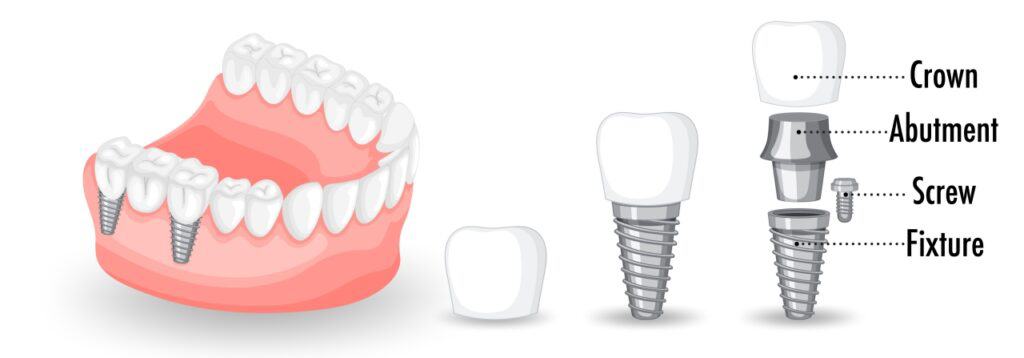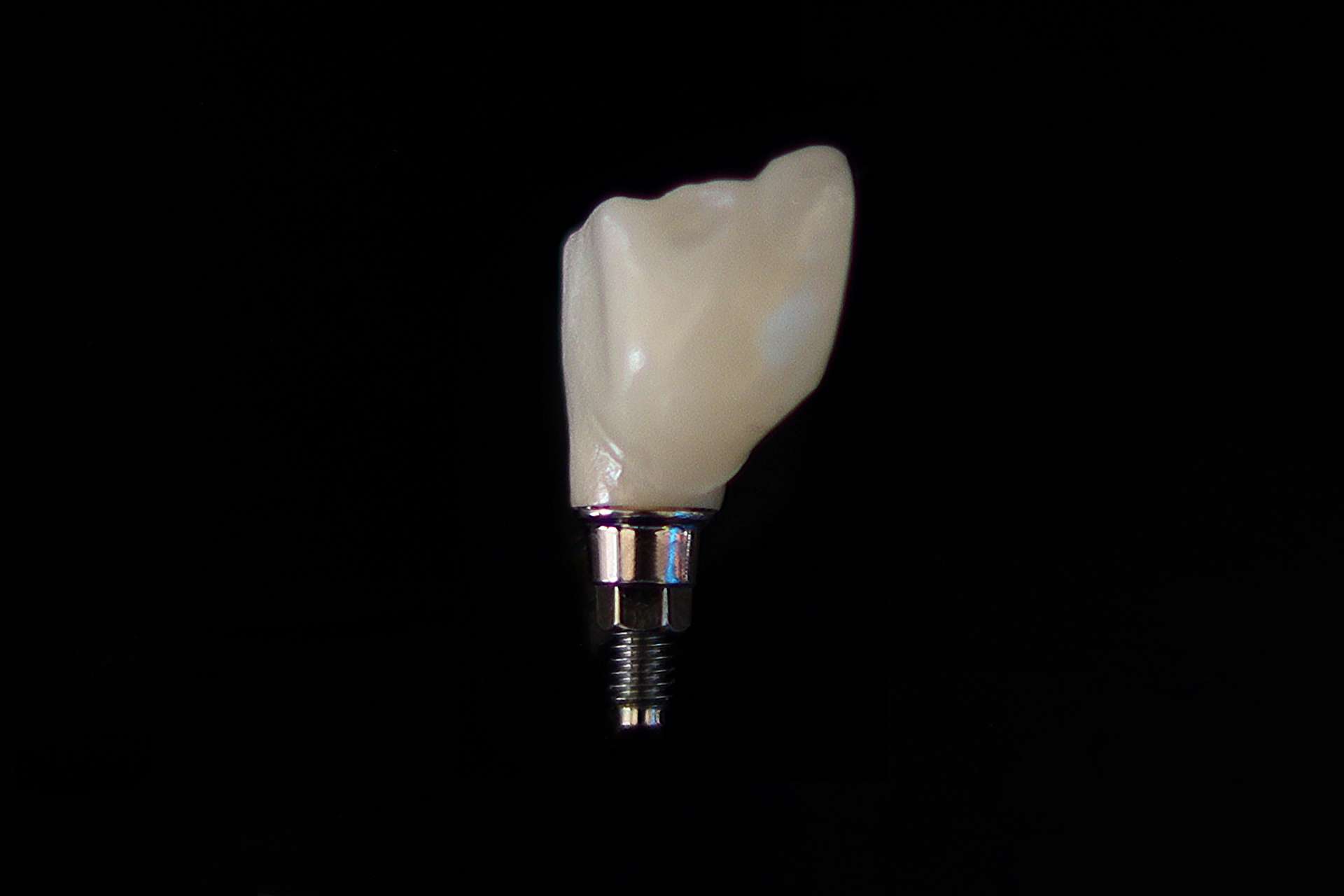A dental implant is the closest thing that you can get to a natural-looking, fully-functioning tooth replacement. They are one of the most successful and reliable procedures in modern dentistry. One of the most common questions I get asked is “How long do dental implants last?”
The good news is that with attentive care, dental implants can outperform and outlast even healthy, real teeth. In fact, some patients enjoy their implants for a lifetime! But it’s not quite that simple. Let me explain.
The Lifespan of Dental Implants
The lifespan of dental implants can vary, with the crown often lasting 10-25 years before requiring attention. The actual implant – usually made from titanium or zirconia – is designed to last a lifetime and rarely needs to be replaced. These ranges are influenced by factors such as oral hygiene, lifestyle and overall oral health, and quality of dental work.
But don’t just take my word for it. Studies and clinical research back up these claims, showing high success rates for dental implants over long periods. For instance, a review in the International Journal of Oral & Maxillofacial Implants highlighted that with proper care, the survival rate of dental implants can be extremely high, even after 20 years.
Components of Dental Implants

A dental implant almost always consists of 3 components:
A titanium or zirconium implant
The implant is a small post that acts as the tooth’s root and is fixed into the jawbone during surgery. It provides a strong foundation to support the dental crown (the visible part). With proper care, it should last a lifetime. Most commonly this is made of titanium, but can sometimes be made of zirconium if the patient has a metal sensitivity.
An abutment
An abutment is fixed into the implant base with a screw and connects it to the crown. The top of the abutment sits above the patient’s gum line and is typically made of the same material as the implant.
A dental crown
The crown is the only part of the dental implant you can see and looks like a natural tooth. Materials used for the crown vary depending on where the implant is located, budget, and aesthetic considerations. The most common materials are resin, porcelain, ceramic, and zirconia. The crown is what wears out first. Most dental crowns last from 5 to 15 years, but some high-quality crowns can last for 25 years or more with a good oral hygiene regimen and biannual dental checkups.
Factors Influencing Dental Implant Lifespan
Quality of the Implant
Beware of low-quality implants as they can cause more problems than they’re worth. If it sounds too cheap to be true, it probably is.
Lower-quality materials will be more easily damaged – such as when chewing hard foods or grinding your teeth under stress.
That’s why we only use high-quality materials in our implants. The extra cost makes it well worth it in the long run. Your teeth and oral health are not areas you want to cut corners on!
It’s rare, but if you get an implant with the wrong type of material, your body can reject it which will cause havoc and be painful and complicated to fix. For example, if you have a known metal sensitivity we will use a zirconia implant instead of titanium.
Professional Expertise and Procedure Quality
A cheap implant might also reflect the experience and skill of the dentist. Make sure you work with a good dentist, preferably a dentist who has a lot of experience with implants.
If you choose a dentist who doesn’t have a lot of experience with implants, there’s a higher chance of complications such – as the implant not fusing with the jawbone properly, or adjustments needed that otherwise wouldn’t be necessary.
You can read about the dental implant procedure timeline here.
Oral Hygiene and Maintenance
While dental implants are designed to be durable and resistant to decay, they are not invincible. They can still get damaged by chewing hard foods like ice or hard candies. And if you have poor oral hygiene, you’ll likely need more implants and dental work in the future.
But most importantly, the tissues around implants can get inflamed or infected more easily than those around natural teeth. This can cause Peri-implantitis, the most common reason implants fail. That’s why regular dental check-ups are crucial. During these visits, I check the health of your implants, gums, and surrounding bone. This helps catch any issues early and keeps your implants in top shape.
Signs That Your Dental Implants May Need Attention
Even though dental implants are designed to last a long time, that doesn’t mean they’re guaranteed to be perfect for the rest of your life. Here are some signs that your dental implant may require attention:
Discomfort or Pain: While some initial discomfort is normal right after the procedure, ongoing or new pain isn’t.
Mobility: Your dental implant should feel as stable as your natural teeth. An implant that is moving around could indicate a problem with the implant itself or the bone around it.
Swelling or Redness: Some swelling and redness are expected right after the implant surgery. But if these symptoms persist or come back after healing, it could be a sign of infection or inflammation.
Difficulty Chewing: If chewing becomes difficult or uncomfortable, it could be a sign that the implant isn’t functioning as it should. An implant should make eating easier, not harder.
Gum Recession: If the gums around your implant start to pull back or recede, exposing more of the implant or the metal post, it’s time for a dental visit. Gum recession can lead to implant instability and other oral health issues. It can also be a sign of Peri-implantitis.
If you notice any of these signs, don’t wait. Contact your dentist for an evaluation to ensure your dental implant remains in good shape and continues to serve you well.
Increasing Your Dental Implant’s Lifespan: Tips and Best Practices
To make sure your dental implants last as long as possible, there are some key tips and best practices you can follow.
Practice Good Oral Hygiene: Just like with natural teeth, keeping your dental implants clean is mandatory. Brush twice a day, floss daily, use antiseptic mouthwash, and consider using an interdental brush to clean around the implant and gum line.
Regular Dental Check-ups: Visiting your dentist regularly for check-ups and cleanings is essential. These visits allow your dentist to monitor the condition of your implant and catch potential issues early.
Mind Your Diet: Eating a balanced diet helps maintain overall oral health. Try to avoid overly hard or sticky foods that could damage the implant or the crown on top. Foods high in calcium and vitamin D are great for supporting bone health.
Wear a Mouthguard if Needed: If you play sports or grind your teeth at night, wearing a grind guard can help protect your implants from excessive force or trauma.
Schedule a Dental Implant Consultation Today
Schedule a consultation with Dr. Steven Rostkier, dentist in Balwyn, VIC to receive personalised advice and explore your dental implant options. Take the first step towards a lasting and beautiful smile today!
If you’re considering dental implants or have any questions about their care and maintenance, send a message via our contact form.
Frequently Asked Questions (FAQs)
What is the failure rate of dental implants?
The failure rate of dental implants is very low and they are one of the most successful procedures in dentistry. Various studies suggest that the success rate of dental implants ranges from 95% to 98% over 10 years. This means the failure rate is generally between 2% and 5%.
Good oral hygiene, overall health, a high-quality implant, and choosing a skilled dentist can further lower the risk of failure.
Are dental implants as strong as natural teeth?
Yes, dental implants can indeed match or even surpass the strength of natural teeth in certain aspects. Thanks to the robust titanium post that fuses with the jawbone through osseointegration, implants provide a solid foundation that is comparable to the root of a natural tooth.
Dental implants are also impervious to decay, so they don’t suffer from cavities like natural teeth. The strength and longevity of the implant are somewhat dependent on the surrounding gums and bone.
How often do dental implants need to be replaced?
The titanium post of the implant is meant to integrate with the jawbone and last a lifetime and do not typically require replacement.
The crown (the artificial tooth placed on top of the implant) may wear out or become damaged over time and could need replacement after 10 to 15 years, but can last much longer if high-quality and taken care of.
What happens when dental implants wear out?
When dental implants “wear out,” it’s usually the crown or the abutment part of the implant that is affected rather than the titanium post itself. Your dentist will remove the worn or damaged crown and fabricate a new one, and then attach it to the existing titanium post.
What happens if my dental implant fails?
If a dental implant fails, the typical next step is to take it out and fix the underlying cause, eg. infection or bone loss. After removing the implant, a healing period is necessary before considering replacement options. This might include attempting another implant or exploring alternatives like bridges or dentures.
Can dental implants last a lifetime?
Yes, with the right care, dental implants can last a lifetime. The titanium post, which fuses with the jawbone, is very durable. It can stay in place for a person’s whole life without issue. The crown on the implant might need replacing after 10 to 15 years because of wear. But, with good oral care and regular dentist visits, the crown can last 25+ years.




